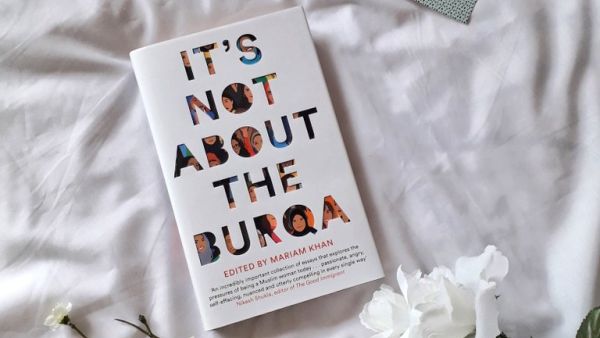"When was the last time you heard a Muslim woman speak for herself without a filter?" That's the question posed by Mariam Khan in her introduction to the essay collection It's Not About the Burqa.
Bringing together 18 women from Muslim backgrounds, the aim of this collection is to give Muslim women a space that they are often denied in public discourse, where discussions about our clothing, freedom and even our thoughts are often outsourced to non-Muslims, or sometimes to Muslim men.
Like any essay collection featuring a range of voices, It's Not About the Burqa is a little uneven, but at its best is thought-provoking reading.
Khan, the collection's editor, has penned one of the strongest essays, the brilliantly titled Feminism Needs to Die. It chronicles her journey to feminism, and the realisation that mainstream feminism is not inclusive because of its focus on white women.
Khan, who begins by asserting that "Islam is a religion that empowers women", details how mainstream feminism will go to the bat for a woman's right to wear what she chooses, but that when it comes to Muslim women is silent because it "disapproves of the hijab, the burqa, modest culture and other key elements of Muslim female identity".
"I am a feminist," writes Khan, "but I'm not sure feminism is for me." It's a dilemma many women, Muslim and beyond, are currently facing.
Another highlight, and undoubtedly one of the essays that will stay with readers long after they've finished it, is journalist Saima Mir's A Woman of Substance, in which she tells of two failed marriages and explores manipulation born of cultural expectations.
Mir married for the first time at 19, and moved to the US to live with her husband, a quiet man, and his mother, a controlling woman whose passive aggressive behaviour was designed to come between the couple.
Divorce followed and then marriage again at the age of 23, this time to a man who gave Mir hope. But moving in with his family subjected Mir to emotional manipulation and abuse, and eventually she sought a divorce.
At one point, Mir discusses how the cultural teachings drilled into her, including the well-known "respect your elders", made it impossible for her to speak up. Like Khan in Feminism Needs to Die, Mir is clear that Islam empowers women; "Islam gave women a voice; cultural interpretation took it away," she writes.
A Woman of Substance is difficult to read in parts – although not as difficult as it was for Mir to write, she describes the experience as being "akin to standing naked in a roomful of mirrors" – but that difficulty simply makes this an even more powerful read.
The essays written by journalists like Mir or writers like Khan are the strongest in the collection, from Amna Saleem's Shame, Shame, It Knows Your Name, about how misogyny against Muslim women sees radical Islamists and white racists sharing the same views, to Coco Khan's humorous Immodesty is the Best Policy, about modesty and spaces for Muslim women.
Where the collection loses steam is in some of essays which stick to a surface level discourse, or which let the opportunity for personal reflection drift by.
YouTuber Amena Khan's Tearing Off the Label begins strongly, looking at how donning a hijab forced her into changing her behaviour to suit others' ideas of what being a hijab-wearing Muslim woman meant, and her challenge to be her true self on and off camera.
But it drifts off course when she begins to talk about her success and her L'Oréal advert, especially when she fails to discuss having to step down from the campaign, which is a missed opportunity.
In Nafisa Bakkar's nuanced essay On the Representation of Muslims, strategically placed after Amena Khan's, the amaliah.com founder does address the controversy, and the idea that brands want "Muslims as an aesthetic, nothing more and nothing less".
Yassmin Midhat Abdul-Magied's essay Life Was Easier Before I Was Woke contains strong elements, discussing how she navigated her identity in a male-dominated environment. But she glosses over an incident in 2017 that led to her being trolled and abused on social media and beyond, telling readers that a "simple Google search" will give us the basics. It's always jarring to have to leave a book and go to an outside source for information, and even more so with a book that is about creating a space for Muslim women to speak.
Lawyer Aina Khan's How Not to Get Married is an interesting look at legal marriage and a persuasive argument for why marriage laws in the UK need to change, but it doesn't quite fit in this collection, feeling more like a paper to be submitted to the government.
But overall, It's Not About the Burqa is a valuable book, fulfilling its aim of giving Muslim women a space of their own. It is, as Khan says in her introduction, "a start, a movement", not a final discussion. I can only hope that it is a catalyst for Muslim women to be allowed to speak and, even more crucially, to be listened to when they do.
It's Not About the Burqa, edited by Mariam Khan, is out on February 21.
This article has been adapted from its original source.








